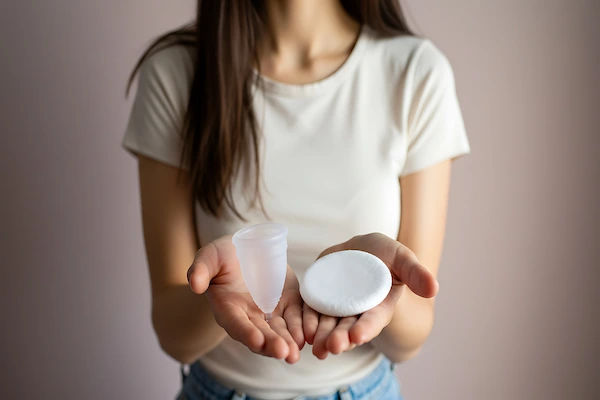Jojoba Oil for Hair: Benefits, Uses, and How to Apply?
Discover jojoba oil benefits for hair care: who it helps, how to use it safely, and what to expect. Simple steps, expert-backed tips, and FAQs.

Written by Dr. Mohammed Kamran
Reviewed by Dr. Rohinipriyanka Pondugula MBBS
Last updated on 13th Jan, 2026

Introduction
If you’re looking for a simple, gentle way to add shine and softness to your hair without buildup, jojoba oil is worth a look. This plant-derived liquid wax is popular in hair care because it’s structurally similar to the natural oils (sebum) your scalp produces. In this guide, you’ll learn the key jojoba oil benefits for hair, who it might help most, how to use it safely, and what results to expect based on current evidence.
What is jojoba oil?
Source: Jojoba oil comes from the seeds of the Simmondsia chinensis plant, native to arid regions.
Texture and chemistry: Although commonly called an oil, it’s technically a liquid wax made primarily of wax esters. This makes it stable (slow to oxidize/rancidify) and lightweight on hair.
Why that matters: Because it resembles human sebum, jojoba oil spreads easily on the scalp and hair shaft, helping to soften and smooth without feeling overly greasy when used in small amounts.
Jojoba oil benefits for hair: What evidence supports it?
Jojoba oil is best known for its emollient and conditioning properties. Here’s what research and dermatologist guidance suggest it can realistically do:
Moisturizes and softens hair
- Acts as an emollient to smooth the hair cuticle, reducing friction and frizz.
- Helps reduce moisture loss from the hair shaft, which can make hair feel softer and look shinier.
- Especially helpful for dry, curly, coily, or chemically processed hair that needs extra conditioning.
Tames frizz and improves manageability
- By coating the hair lightly, jojoba oil can reduce flyaways and make detangling easier, which may help limit mechanical breakage during brushing and styling.
Scalp comfort
- May help soothe dryness and scalp tightness by softening skin and reducing flaking due to dryness.
- Note: Dandruff (seborrheic dermatitis) typically requires medicated shampoos (e.g., zinc pyrithione, selenium sulfide, ketoconazole). Jojoba oil can moisturize, but it isn’t a dandruff treatment.
Consult a Top General Physician
Color and heat styling support
- Conditioning oils like jojoba can add shine and help protect hair from friction during heat styling.
- Always use a dedicated heat protectant if you apply hot tools.
Antioxidant content
- Naturally contains tocopherols (forms of vitamin E), which provide antioxidant effects in formulas. While this may help protect the oil itself from oxidation, it doesn’t replace UV or heat protectants.
What jojoba oil is not proven to do?
- Hair growth claims: There is no strong clinical evidence that jojoba oil stimulates hair growth or reduces hair shedding. If hair loss is a concern, see a dermatologist to discuss proven options.
- Repair split ends: Oils can make splits less noticeable by smoothing them temporarily, but they cannot repair them. Regular trims are the only way to remove split ends.
Who can benefit most from jojoba oil?
- Dry, curly, coily, or high-porosity hair: Benefits from extra emollience and cuticle smoothing.
- Thick or coarse hair: Often tolerates slightly larger amounts without looking greasy.
- Fine or easily weighed-down hair: Can still use it—just apply tiny amounts to the ends only.
- -Dry scalp or tight-feeling scalp: A small amount massaged into the scalp can improve comfort from dryness (but won’t treat scalp disorders).
How to use jojoba oil in your hair care routine?
Start with less than you think you need (1–3 drops), then adjust. Clean hands and consistent, gentle technique matter more than quantity.
1) Pre-shampoo oiling (for softness and easier detangling)
Who it helps: Dry, frizzy, tangled, curly/coily hair.
How to:
- On dry hair, rub 4–8 drops between your palms (use less for fine hair, more for thick/coarse).
- Start at mid-lengths to ends; comb through.
- Leave on 15–30 minutes before shampooing. You can use a shower cap to reduce mess.
- Shampoo and condition as usual.
2) Conditioner booster
- Add 1–3 drops of jojoba oil to a dollop of your rinse-out conditioner in your palm.
- Apply from mid-lengths to ends, leave on 2–3 minutes, then rinse.
3) Lightweight leave-in for shine and frizz control
After washing, on damp hair:
- Fine hair: 1–2 drops on ends only.
- Medium hair: 2–4 drops on mid-lengths to ends.
- Thick/coarse hair: 3–6 drops as needed.
- Warm the oil in your hands and smooth it on. Style as usual.
4) Scalp massage for dryness (not for active dandruff)
- Part hair into sections.
- Apply 2–5 drops total to fingertips and gently massage the scalp for 2–3 minutes.
- Leave on for 20–30 minutes before washing or leave overnight if your scalp tolerates oils well.
- Avoid heavy application if your scalp gets oily quickly or if you’re acne-prone along the hairline.
5) Hot oil treatment (occasional deep conditioning)
- Place 1–2 teaspoons of jojoba oil in a small glass bottle and warm it by setting the bottle in a mug of hot (not boiling) water for a few minutes. Test temperature on your wrist.
- Apply to mid-lengths and ends; clip hair up and cover with a shower cap for 20–30 minutes.
- Shampoo and condition.
How much should you use?
- Fine or short hair: 1–2 drops for leave-in; 3–4 drops for pre-shampoo.
- Medium or shoulder-length hair: 2–4 drops leave-in; 4–6 drops pre-shampoo.
- Thick, coarse, or long hair: 3–6 drops leave-in; 6–10 drops pre-shampoo.
- Tip: If hair looks greasy, you used too much. Shampoo or use a clarifying rinse and reduce the amount next time.
How often should you use it?
- As a leave-in: 1–3 times per week for most; daily on ends if very dry.
- Pre-shampoo: Weekly or biweekly.
- Scalp massage: Once weekly if you have dry scalp; avoid if you tend toward oily scalp, folliculitis, or acne along the hairline.
Is jojoba oil safe? What to know about side effects?
- Generally well tolerated on skin and hair when used topically.
- Allergies are uncommon but possible. Do a patch test: Apply a drop inside the forearm or behind the ear daily for 2–3 days. Stop if redness, itching, or irritation occurs.
- Acne-prone or very oily scalp/skin: Any oil can potentially contribute to clogged pores in some people. Start small, avoid the hairline if you’re acne-prone, and monitor your skin.
- Scalp conditions: For dandruff, psoriasis, or eczema, follow dermatologist-recommended treatments. Oils may soothe dryness but are not first-line treatments for these conditions.
- Pregnancy and breastfeeding: Jojoba oil is generally considered safe topically. Avoid adding essential oils unless cleared by your clinician, as some can irritate skin or aren’t recommended.
How to choose a good jojoba oil?
- Look for 100% pure, cold-pressed, unrefined jojoba oil with no added fragrance or fillers.
- Packaging: Dark glass bottles help protect from light.
- Labels: “Hexane-free” and “organic” can be useful markers, though not strictly necessary for effectiveness.
- Shelf life and storage: Store tightly closed in a cool, dark place. Jojoba is naturally stable, but discarded if the scent or texture changes.
How does jojoba oil compare to other hair oils?
- Jojoba vs. coconut oil: Coconut oil penetrates the hair shaft more and can reduce protein loss for some hair types, but it’s heavier and can look greasy on fine hair. Jojoba is lighter and great for smoothing and shining.
- Jojoba vs. argan oil: Both are lightweight. Argan is a triglyceride-rich oil; jojoba is a wax ester.
- Many find jojoba a touch lighter and less likely to weigh hair down.
- Jojoba vs. castor oil: Castor is very thick and occlusive, often too heavy for fine hair. Jojoba spreads more easily and rinses out more cleanly.
When to see a dermatologist?
- You notice sudden or patchy hair loss, scalp pain, persistent itching, or scaling.
- Dandruff doesn’t improve after a few weeks of medicated shampoo use.
- You have scalp acne or folliculitis aggravated by oils.
What results can you expect?
- Immediate: Softer feel, enhanced shine, less frizz.
- Short term (1–4 weeks): Easier detangling, fewer tangles and possibly less breakage from mechanical damage.
- Long term: Improved manageability if used consistently with a gentle, well-rounded routine (appropriate shampooing, conditioning, heat protection, and trims).
- Remember, jojoba oil benefits hinge on using small amounts and pairing the oil with healthy hair care habits.
Simple routines by hair goal
- For shine without weight: After washing, apply 1–2 drops to damp ends; air dry or diffuse.
- For dryness and frizz: Weekly pre-shampoo oiling + 2–4 drops as leave-in on wash days.
- For curly/coily hair: Add 2–3 drops to rinse-out conditioner; use 3–6 drops as leave-in on damp hair, scrunching to define curls.
- For dry scalp comfort: 2–5 drops massaged gently into the scalp once weekly, then washed.
Consult a Top General Physician
Consult a Top General Physician

Dr Aakash Andgi
General Physician/ Internal Medicine Specialist
9 Years • MBBS MD
Bengaluru
Apollo Clinic, JP nagar, Bengaluru

Dr. Sougata Kumar
General Practitioner
8 Years • MBBS
East Midnapore
VIVEKANANDA SEBA SADAN, East Midnapore
Dr. Paras Gangwal
General Physician/ Internal Medicine Specialist
28 Years • MBBS,MD General Medicine
Delhi
Dr Paras Gangwal Clinic, Delhi

Dr. Santanu Mandal
General Physician/ Internal Medicine Specialist
17 Years • MD (Physician), DNB (General Medicine)
Kolkata
MCR SUPER SPECIALITY POLY CLINIC & PATHOLOGY, Kolkata
(25+ Patients)

Dr Syed Mizra M
General Physician/ Internal Medicine Specialist
2 Years • MBBS
Bengaluru
PRESTIGE SHANTHINIKETAN - SOCIETY CLINIC, Bengaluru
Consult a Top General Physician

Dr Aakash Andgi
General Physician/ Internal Medicine Specialist
9 Years • MBBS MD
Bengaluru
Apollo Clinic, JP nagar, Bengaluru

Dr. Sougata Kumar
General Practitioner
8 Years • MBBS
East Midnapore
VIVEKANANDA SEBA SADAN, East Midnapore
Dr. Paras Gangwal
General Physician/ Internal Medicine Specialist
28 Years • MBBS,MD General Medicine
Delhi
Dr Paras Gangwal Clinic, Delhi

Dr. Santanu Mandal
General Physician/ Internal Medicine Specialist
17 Years • MD (Physician), DNB (General Medicine)
Kolkata
MCR SUPER SPECIALITY POLY CLINIC & PATHOLOGY, Kolkata
(25+ Patients)

Dr Syed Mizra M
General Physician/ Internal Medicine Specialist
2 Years • MBBS
Bengaluru
PRESTIGE SHANTHINIKETAN - SOCIETY CLINIC, Bengaluru
More articles from General Medical Consultation
Frequently Asked Questions
Does jojoba oil make hair grow faster?
There’s no strong clinical evidence that jojoba oil speeds hair growth. It can make hair feel softer and reduce breakage from friction, which may help hair look fuller over time. For thinning or shedding, talk with a dermatologist about proven treatments.
Can I use jojoba oil on an oily scalp?
Yes, but keep it minimal. Use 1–2 drops as a pre-shampoo scalp massage, then wash. If your scalp becomes oilier or you notice clogged pores near the hairline, stop.
Is jojoba oil safe for color-treated hair?
Generally yes. Many people find it boosts shine and softness. Use small amounts, focus on mid-lengths and ends, and avoid heavy application close to the roots so hair doesn’t look flat.
How often should I apply jojoba oil?
1–3 times weekly work for most people. Very dry hair may benefit from a tiny daily amount on the ends. Adjust based on how your hair looks and feels.
Can I mix jojoba oil with essential oils?
You can, but proceed carefully. Essential oils can irritate the scalp. If you choose to add them, keep dilution low (often 0.5–1% for leave-on scalp products) and do a patch test. Many people get great results using jojoba oil alone.




